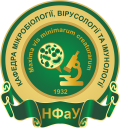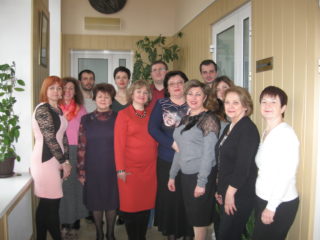CONGRATULATIONS ON THE DEPARTMENT’S 90TH ANNIVERSARY
The glorious Department of Microbiology, Virology, and Immunology of the National Pharmaceutical University turns 90 this year. During these years of its existence, the department became not only a center of education but also of science. During the 90 years of its existence, the employees of the department created and took part in the development of many medicinal products: anti-tuberculosis vaccine “BC-Kharkiv”; “Ektericide”; “Ekterizol”; “Diclofenac-retard”; “Altan” and others. This is a great merit of previous and current generations of employees of this department.
DEVELOPMENT AND ESTABLISHMENT OF THE DEPARTMENT
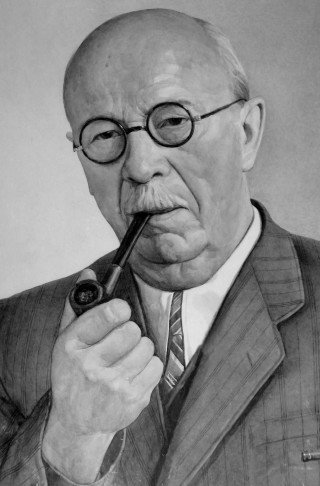
The Department of Microbiology, Virology, and Immunology of the National Pharmaceutical University was founded in 1932 by Academician M.M. Solovyov, an outstanding scientist in the fields of microbiology and epidemiology. Heading the organization of the anti-epidemic service in Ukraine,
Mykhailo Mykolayovych Solovyov created an epidemiological concept of fighting cholera. The priority scientific direction of the department’s work at that time was the development of highly effective disinfectants, antiseptics, and other antimicrobial agents. The fundamental scientific research of the department’s employees was implemented in practical epidemiology. At the department, as well as in adjacent institutions headed by Academician M.M. Solovyov (epidemiological department of the I.I. Mechnikov Kharkiv Bacteriological Institute, the Department of Epidemiology of the Kharkiv Medical Institute, and the Ukrainian Institute for the Advancement of Physicians) trained microbiologists and epidemiologists. Under the scientific supervision of M.M. Solovyov, 10 doctoral theses and 50 candidate theses were completed. At that time, assistants Savoyskyi I.I. and H.G. Rubinstein worked at the Department of Microbiology. The staff of the department included a laboratory assistant and a druggist.
From 1934 to 1941, the Department of Microbiology headed by Professor S.A. Blinkin, whose activity is related to the specialization of the department concerning the specialty of the pharmacist. In the directions identified by M.M. Solovyov, programs for the development of antibacterial drugs and the study of antibiotics were formed. 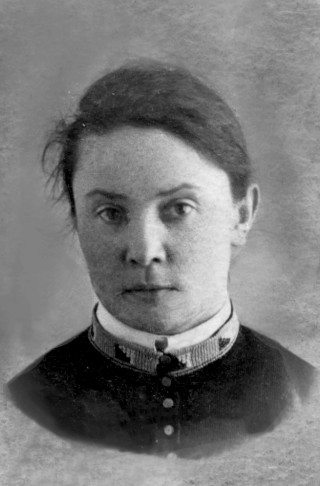 In the pre-war period, the department was provided with the necessary equipment: two thermostats, an autoclave, a centrifuge, a Koch apparatus for coagulation of serum, a Pasteur oven, microscopes, etc. The appropriate amount of laboratory utensils, chemical reagents, and dyes in a complex with modern at that time equipment created a sufficient material base for conducting high-quality laboratory classes with students of the pharmaceutical institute. Assistants of the department I.I. Savoyskyi, H.M. Fisher, and H.G. Rubinstein, in addition to educational and methodological work, carried out fruitful scientific work. It was at that time that the study of the bactericidal properties of fish oil was started. The results of laboratory studies proved that fish and dolphin oil have a bactericidal effect on a relatively wide range of bacteria – pyogenic cocci, Pseudomonas aeruginosa, and dysenteric bacteria. During the pre-war, war and post-war periods, the Department of Microbiology was headed by Associate Professor Olga Vasylivna Chuyko. The scientific activity of the department was related to the development of new antibacterial drugs, sterilizing liquids, and disinfectants based on microbiological screening of substances synthesized at the institute. In 1945, despite the extremely difficult working conditions at the institute, when there were no equipment, reagents, laboratory utensils, equipment, and the premises of the institute were not heated, Olga Vasylivna organized work to restore the educational process and research work at the department. Significantly, the work of O.V. was recognized as one of the best scientific works of the institute this year. Chuiko “Effect of sulfonamide compounds on pyogenic cocci”. In the following years, O.V. Chuyko organized new areas of scientific and research work: studying the causes and conditions of the variability of pneumococci, studying the bactericidal properties in vitro and in vivo of individual fractions of different essential oils (eucalyptus, mint, coriander), developing new methods of air disinfection and sterilization of pharmacy utensils. Employees of the department also studied the issue of aseptic production of medicines in pharmacies in the city of Kharkiv. The materials of scientific research, in which the leading scientists of the institute (H.P. Pivnenko, L.S. Kazarnovskyi, etc.) were involved, were published in scientific anthologies and specialized journals. Special attention was paid by O.V. Sensitive to the active involvement of students in research work. So, from 1952 to 1953, I.M. was an active member of the scientific society of the Department of Microbiology. Pertsev, later a Doctor of Pharmaceutical Sciences, Professor, Honored Worker of Health Protection of Ukraine, and Honored Professor of the National Academy of Sciences. The students’ scientific research under her leadership had a clear professional orientation and gained high appreciation and significance for practical pharmacy. For example, the results of the work of students at the Department of Microbiology on the study of the effectiveness of the action of disinfectants on the microflora of pharmacy utensils were handed over to the Regional Pharmacy Department and put into practice.
In the pre-war period, the department was provided with the necessary equipment: two thermostats, an autoclave, a centrifuge, a Koch apparatus for coagulation of serum, a Pasteur oven, microscopes, etc. The appropriate amount of laboratory utensils, chemical reagents, and dyes in a complex with modern at that time equipment created a sufficient material base for conducting high-quality laboratory classes with students of the pharmaceutical institute. Assistants of the department I.I. Savoyskyi, H.M. Fisher, and H.G. Rubinstein, in addition to educational and methodological work, carried out fruitful scientific work. It was at that time that the study of the bactericidal properties of fish oil was started. The results of laboratory studies proved that fish and dolphin oil have a bactericidal effect on a relatively wide range of bacteria – pyogenic cocci, Pseudomonas aeruginosa, and dysenteric bacteria. During the pre-war, war and post-war periods, the Department of Microbiology was headed by Associate Professor Olga Vasylivna Chuyko. The scientific activity of the department was related to the development of new antibacterial drugs, sterilizing liquids, and disinfectants based on microbiological screening of substances synthesized at the institute. In 1945, despite the extremely difficult working conditions at the institute, when there were no equipment, reagents, laboratory utensils, equipment, and the premises of the institute were not heated, Olga Vasylivna organized work to restore the educational process and research work at the department. Significantly, the work of O.V. was recognized as one of the best scientific works of the institute this year. Chuiko “Effect of sulfonamide compounds on pyogenic cocci”. In the following years, O.V. Chuyko organized new areas of scientific and research work: studying the causes and conditions of the variability of pneumococci, studying the bactericidal properties in vitro and in vivo of individual fractions of different essential oils (eucalyptus, mint, coriander), developing new methods of air disinfection and sterilization of pharmacy utensils. Employees of the department also studied the issue of aseptic production of medicines in pharmacies in the city of Kharkiv. The materials of scientific research, in which the leading scientists of the institute (H.P. Pivnenko, L.S. Kazarnovskyi, etc.) were involved, were published in scientific anthologies and specialized journals. Special attention was paid by O.V. Sensitive to the active involvement of students in research work. So, from 1952 to 1953, I.M. was an active member of the scientific society of the Department of Microbiology. Pertsev, later a Doctor of Pharmaceutical Sciences, Professor, Honored Worker of Health Protection of Ukraine, and Honored Professor of the National Academy of Sciences. The students’ scientific research under her leadership had a clear professional orientation and gained high appreciation and significance for practical pharmacy. For example, the results of the work of students at the Department of Microbiology on the study of the effectiveness of the action of disinfectants on the microflora of pharmacy utensils were handed over to the Regional Pharmacy Department and put into practice.
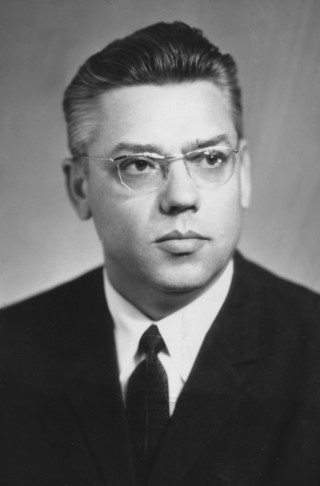 In the 1953-1954 academic years, the Department of Microbiology was merged with the Department of Hygiene, and in 1965 – with the course of Medical Commodity Science, and for a certain time it was called the Department of Microbiology and Medical Commodity Science. In 1968, the department introduced a course of pre-medical care. Assistant professor O.P. was in charge of the hygiene course. Stepanov, and the course of pre-medical care – L.S. Kokarev. In 1968, the Department of Microbiology was headed by Associate Professor Oleksandr Ivanovich Goncharov – a follower of the member of the Cor. AMS of the USSR V.S. Derkacha and Acad. AMS of the USSR M.M. Solovyov. The scientific developments of the department in the late 1960s – the first half of the 1970s were carried out in two directions: the study of adjuvant properties of bacterial endotoxins and the study of the activity of acrid preparations of a new series synthesized at the institute’s pharmaceutical and organic chemistry departments. Forming a scientific school based on sound microbiological screening, the employees of the Department of Microbiology during this period not only developed objective evaluation criteria for the selection of substances synthesized at the KhFI but also formulated a direction for the creation of antibacterial and immunological preparations from plant and animal raw materials. It is during this period that teachers I.Yu. Kholupyak and O.M. Wild The drug “Aldocid” was developed, a candidate’s thesis was completed (O.M. Dyka), the immunostimulant “Polysaccharide” was developed, fundamental research was conducted on the effect of this drug on the inflammatory process, which was of significant importance for practical medicine. In 1976-1979, the Department of Microbiology was managed by Doctor of Medical Sciences L.M. Kislyakova and Professor N.M. Madievska During this period, the department of microbiology was temporarily merged with the department of biochemistry, which significantly contributed to the development of scientific programs in microbiology, allowing to study of the biochemical processes of bacterial cells and their connection with the influence of antibiotics.
In the 1953-1954 academic years, the Department of Microbiology was merged with the Department of Hygiene, and in 1965 – with the course of Medical Commodity Science, and for a certain time it was called the Department of Microbiology and Medical Commodity Science. In 1968, the department introduced a course of pre-medical care. Assistant professor O.P. was in charge of the hygiene course. Stepanov, and the course of pre-medical care – L.S. Kokarev. In 1968, the Department of Microbiology was headed by Associate Professor Oleksandr Ivanovich Goncharov – a follower of the member of the Cor. AMS of the USSR V.S. Derkacha and Acad. AMS of the USSR M.M. Solovyov. The scientific developments of the department in the late 1960s – the first half of the 1970s were carried out in two directions: the study of adjuvant properties of bacterial endotoxins and the study of the activity of acrid preparations of a new series synthesized at the institute’s pharmaceutical and organic chemistry departments. Forming a scientific school based on sound microbiological screening, the employees of the Department of Microbiology during this period not only developed objective evaluation criteria for the selection of substances synthesized at the KhFI but also formulated a direction for the creation of antibacterial and immunological preparations from plant and animal raw materials. It is during this period that teachers I.Yu. Kholupyak and O.M. Wild The drug “Aldocid” was developed, a candidate’s thesis was completed (O.M. Dyka), the immunostimulant “Polysaccharide” was developed, fundamental research was conducted on the effect of this drug on the inflammatory process, which was of significant importance for practical medicine. In 1976-1979, the Department of Microbiology was managed by Doctor of Medical Sciences L.M. Kislyakova and Professor N.M. Madievska During this period, the department of microbiology was temporarily merged with the department of biochemistry, which significantly contributed to the development of scientific programs in microbiology, allowing to study of the biochemical processes of bacterial cells and their connection with the influence of antibiotics.
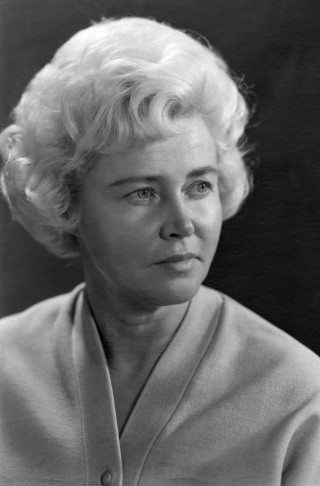 In the 1980s, the subject of the department expanded. From 1983 to 1988, the head of the department was Professor Tamara Ivanovna Zakharova, a famous specialist in the field of mycology and dermatology.
In the 1980s, the subject of the department expanded. From 1983 to 1988, the head of the department was Professor Tamara Ivanovna Zakharova, a famous specialist in the field of mycology and dermatology.
It was then that a new scientific direction on the synthesis of antifungal substances was launched and a scientific program for their screening was developed. Scientific and theoretical programs had a direct connection with clinical medicine, and the results of searches were tested in experiments and clinical conditions.
New areas of mycological diagnostics have gained significant importance. During this period, new employees come to the department – N.Yu. Shevelyova and L.F. Silaev, who carry out a large amount of experimental research – screening of compounds synthesized at the departments of organic, pharmaceutical, inorganic, and analytical chemistry for antibacterial and antifungal activity, determination of antimicrobial properties of synthetic compounds – nitro-derivatives of 9-arylamino acridines, heterylamides of dicarboxylic acids, etc., substances of plant origin.
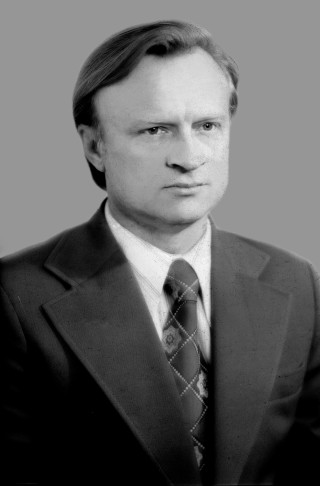 Since 1987, the Department of Microbiology has been headed by Doctor of Medical Sciences, Academician of the National Academy of Sciences, Professor Ihor Leonidovych Dykiy. The spectrum of scientific research has been enriched by microbiological and immunological substantiation of natural and synthetic compounds promising for the creation of appropriate dosage forms, microbiological substantiation of the composition of preparations – beekeeping products, preparations of plant origin, improvement of methods for determining the microbiological purity of medicinal substances and medicinal preparations. Employees of the department carry out fruitful cooperation with the departments of organic, inorganic, analytical chemistry, departments of pharmacy and industrial technology of drugs, and pharmacognosy, take an active part in the work of numerous scientific conferences devoted to topical issues of microbiology, immunology, and virology. Over the past twenty years, the department has worked on obtaining toxoids, diagnostic antigens and allergens of microbial and tissue origin, and vaccines. Liposomal forms of antibiotics, immunomodulators, and anti-inflammatory substances for external, internal, and parenteral use are being developed at the department using proprietary technologies. The staff of the department continues to grow with new employees who have progressed from senior laboratory technicians to associate professors of the department – candidates of pharmaceutical (M.M. Velika) and medical (O.G. Heiderich) sciences. N.V. comes to the department. N. Dubinina – a candidate in medical sciences, O.A. Bocharov – a candidate in veterinary sciences and V.S. Truh is a Candidate in Biological Sciences. Performs the duties of a senior laboratory assistant and works on the candidate’s thesis of O.A. Shakun Under the leadership of I.L. Dyky completed 11 doctoral theses and 25 candidate theses. Based on the results of research, the department’s employees have developed more than 30 antimicrobial and other clinical preparations: antiseptics ektericide, aldocid, tuberculocide, anti-tuberculosis vaccine “BK-Kharkiv”, which was recognized by the MSG of the USSR as promising for introduction into veterinary and clinical medicine for the prevention of bovine tuberculosis livestock; blue pus toxoid, which is used in clinical medicine to obtain donor hyperimmune sera with pronounced therapeutic and prophylactic properties in septicopyemic forms of pyocyanosis; sodium salt of sulfoxyphenazine, obtained on the basis of and taking into account the antigenic and immunogenic properties of pyocyanin pigment, which is recommended for the prevention and treatment of purulent infection;; a dispersion medium that ensures the stability of pharmacosomes, pharmacosomes and immunosomes; a device for the treatment of tonsillitis in the form of an injector designed for the introduction of a composite composition into the palate, which provides a therapeutic effect while preserving the tonsils in 95-99% of cases; liposomal preparation “Egrasom” intended for inhalation for the treatment of respiratory tuberculosis, pneumonia and infectious-allergic bronchial asthma; aerosol preparations “Ekterizol”, “Ferrekterizol”; ointments: Gentaxid, Kataviol, Hexadimecil, ointment with analbene; tablets “Dekaceol”, “Krateflan”, “Diclofenac-retard”, etc. The technology for obtaining allergy diagnostics from a neutralized mass of tubercular bacteria was created. For the creation and introduction into industrial production of the antibacterial drug “Ektericide”, Ihor Leonidovych Dykiy was awarded the bronze medal of the VDNG of the USSR. The scientific activity of the department staff is highlighted in printed scientific publications, among them “Methodical recommendations for the detection and prevention of mycoplasma cell infection cultures used in virological research and biotechnology of biologically active preparations” (B.T. Stegnii, N.I. Sokhatskyi, I.L. Dykiy, et al., 1999) and “Prospects of phytotherapy in the treatment of diabetes mellitus” (IL Dykiy, L.M. Maloshtan, V.I. Dykhtyaryov, V.M. Kovalev, et al., 1994). Employees of the department received 29 patents and 39 certificates for inventions.
Since 1987, the Department of Microbiology has been headed by Doctor of Medical Sciences, Academician of the National Academy of Sciences, Professor Ihor Leonidovych Dykiy. The spectrum of scientific research has been enriched by microbiological and immunological substantiation of natural and synthetic compounds promising for the creation of appropriate dosage forms, microbiological substantiation of the composition of preparations – beekeeping products, preparations of plant origin, improvement of methods for determining the microbiological purity of medicinal substances and medicinal preparations. Employees of the department carry out fruitful cooperation with the departments of organic, inorganic, analytical chemistry, departments of pharmacy and industrial technology of drugs, and pharmacognosy, take an active part in the work of numerous scientific conferences devoted to topical issues of microbiology, immunology, and virology. Over the past twenty years, the department has worked on obtaining toxoids, diagnostic antigens and allergens of microbial and tissue origin, and vaccines. Liposomal forms of antibiotics, immunomodulators, and anti-inflammatory substances for external, internal, and parenteral use are being developed at the department using proprietary technologies. The staff of the department continues to grow with new employees who have progressed from senior laboratory technicians to associate professors of the department – candidates of pharmaceutical (M.M. Velika) and medical (O.G. Heiderich) sciences. N.V. comes to the department. N. Dubinina – a candidate in medical sciences, O.A. Bocharov – a candidate in veterinary sciences and V.S. Truh is a Candidate in Biological Sciences. Performs the duties of a senior laboratory assistant and works on the candidate’s thesis of O.A. Shakun Under the leadership of I.L. Dyky completed 11 doctoral theses and 25 candidate theses. Based on the results of research, the department’s employees have developed more than 30 antimicrobial and other clinical preparations: antiseptics ektericide, aldocid, tuberculocide, anti-tuberculosis vaccine “BK-Kharkiv”, which was recognized by the MSG of the USSR as promising for introduction into veterinary and clinical medicine for the prevention of bovine tuberculosis livestock; blue pus toxoid, which is used in clinical medicine to obtain donor hyperimmune sera with pronounced therapeutic and prophylactic properties in septicopyemic forms of pyocyanosis; sodium salt of sulfoxyphenazine, obtained on the basis of and taking into account the antigenic and immunogenic properties of pyocyanin pigment, which is recommended for the prevention and treatment of purulent infection;; a dispersion medium that ensures the stability of pharmacosomes, pharmacosomes and immunosomes; a device for the treatment of tonsillitis in the form of an injector designed for the introduction of a composite composition into the palate, which provides a therapeutic effect while preserving the tonsils in 95-99% of cases; liposomal preparation “Egrasom” intended for inhalation for the treatment of respiratory tuberculosis, pneumonia and infectious-allergic bronchial asthma; aerosol preparations “Ekterizol”, “Ferrekterizol”; ointments: Gentaxid, Kataviol, Hexadimecil, ointment with analbene; tablets “Dekaceol”, “Krateflan”, “Diclofenac-retard”, etc. The technology for obtaining allergy diagnostics from a neutralized mass of tubercular bacteria was created. For the creation and introduction into industrial production of the antibacterial drug “Ektericide”, Ihor Leonidovych Dykiy was awarded the bronze medal of the VDNG of the USSR. The scientific activity of the department staff is highlighted in printed scientific publications, among them “Methodical recommendations for the detection and prevention of mycoplasma cell infection cultures used in virological research and biotechnology of biologically active preparations” (B.T. Stegnii, N.I. Sokhatskyi, I.L. Dykiy, et al., 1999) and “Prospects of phytotherapy in the treatment of diabetes mellitus” (IL Dykiy, L.M. Maloshtan, V.I. Dykhtyaryov, V.M. Kovalev, et al., 1994). Employees of the department received 29 patents and 39 certificates for inventions.
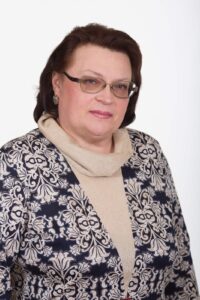 Since 2008, the Department of Microbiology, Virology, and Immunology has been headed by Doctor of Medical Sciences, Professor Nataliya Igorivna Filimonova.
Since 2008, the Department of Microbiology, Virology, and Immunology has been headed by Doctor of Medical Sciences, Professor Nataliya Igorivna Filimonova.
It continues the development of the scientific direction defined by I.L. Wild Under her supervision, 4 candidate theses were completed, Allergodiagnosticum “Candidosin”, “Ointment “Hexaphenoxide” was developed. The staff of the department of microbiology, virology, and immunology. First row (from left to right): O.G. Heiderich, N.I. Filimonova, O.M. Wild.; second row: N.V. Dubinina, L.F. Silaeva, O.A. Shakun, K.S. Pyachenkova), third row: N.Yu. Shevelyova, O.A. Bocharov, V.S. Truh.
Under the guidance of Nataliya Ihorivna, the department is constantly developing new educational and methodological literature. Department employees actively publish their research in scientific publications, which are indexed in scientific and metric databases.
The department prepares students of the second level of higher education according to the “Laboratory diagnostics” educational program. The topic of qualification works is characterized by relevance, scientific novelty and has a practical orientation. During the defense, master’s students demonstrate an excellent level of professional training.
2018- 2023
The staff of the department of microbiology, virology, and immunology.
